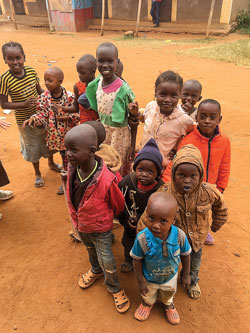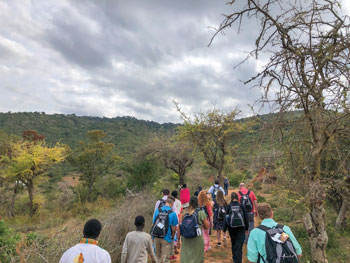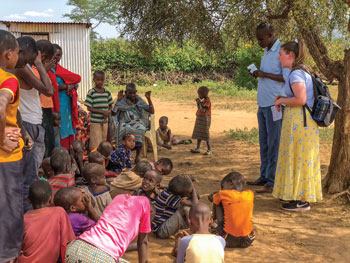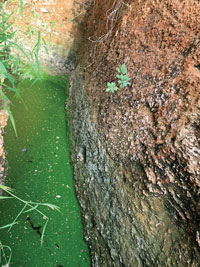Kentucky church sees 120 salvations in Kenya
LOUISVILLE—A Kentucky Baptist church experienced a new beginning in its evangelistic efforts in June, taking the gospel to a poverty-stricken area in Kenya. The effort resulted in 120 Kenyans coming to faith in Christ during the seven days the mission team was there.

Submitted photo
Children in Kenya gather around to hear members of the Ormsby Heights mission team.
It had been about eight years since Ormsby Heights Baptist Church had a mission team leave the U.S.—the church previously sent people to Haiti and Acuna, Mexico. The plan to go to Kenya originated when youth pastor Brent Phillips related his experience from a previous Kenya trip, and he was able to connect his church group with a church planting effort in the African country.
“I have a connection with Kenya and a real heart for the people there,” Phillips said. “I knew an organization there that would take us as they help to plant a new church. We were the first ground workers for the new church plant—the first feet on the ground sharing the gospel. The hope is to launch a new church there this year.”
Bobby and Crissy Merideth, who work with that age group at Ormsby, and Phillips spearheaded the team’s work.
The mission team was primarily college-age students as well as one high schooler — Isaac Frech, Devin Merrifield, Annabelle Ramirez, Jennifer Givens, Aaron Saylor, Aaron Lee, Robby Merideth, Laney Merideth and Delayna Holman. Other than cruises, most of the team had never been outside the U.S. border.

Submitted photo
Telling people in Kenya about Jesus involved a great deal of walking. Here, the group walks down a rough path to reach the next hut. Homes were at least half a mile from each other. Mission team members often walked up steep hills, through deep ditches and encountered other obstacles to get to the next home to share the good news about Jesus.
“We were in a very remote area,” said Bobby Merideth. “We walked a lot—often it was a half mile or farther between the mud huts we visited. There had been a minimal gospel presence there—and what there had been was a prosperity gospel. I can’t tell you how many huts we visited where the name of Jesus had never been heard. We were invited to a school—there is no separation of church and state there.”
The Ormsby delegation focused their efforts on the Maasai tribe, which was “welcoming to the gospel.”
Merideth added that the people were “incredibly polite and respectful and open to hearing the news of Jesus.”
Phillips said the Maasai men are known as the “warriors of Africa”—they are hunters and gatherers. The tribe is spread out, which resulted in the mission team navigating paths and walking long distances each day.
The team was invited into a school to present their gospel message through interpreters, which often were pastors in the area. “We had a worship service and Bible studies,” Phillips noted, who estimated the team was able to witness to almost 1,000 people. “It couldn’t have been smoother. We had two local people—Daniel and Joan Kinuthia—who coordinated it for us. They are incredible folks with a heart for God. Our translators knew the Word of God.”
“We walked where paths were rocky and dusty to get to their huts,” Merideth said. “A few of them had seen a Bible, but they had only heard a prosperity gospel. There’s lots of pluralism there.”

Submitted photo
Laney Merideth shares the gospel with a family.
Phillips displayed a set of cards that were used to illustrate a gospel message based on the “Roman road.” It was a visual presentation to explain that all people are sinners and all have sinned, but that Jesus died on the cross as the sacrifice for their sin and was resurrected to defeat sin, death and the grave, and that He calls people to repentance and faith in Him. “We told them Jesus is the way, not a way,” Phillips said.
The way of life in that third world country made an immediate impact on the team. “Land there costs 30 U.S. dollars an acre. There were times when driving you would come upon a herd of cattle or goats in your path,” Merideth said.
The language proved to be a hurdle. As the team traveled to various villages, some of the dialects were different, resulting in the interpreters having difficulty communicating with the locals. “The barriers could be challenging, but the people were patient and respectful in the face of sheer poverty,” Merideth said.
The squalid conditions made an immediate impression on the group. “Their water source was green,” Phillips said. “They would scrape the algae off the top of it, and it was water which was hard to boil. The women would often walk a mile to get water for a group of people.”
Tribespeople lived in primitive huts with no windows—huts were no larger than a normal size office space in America, and four or more people would live in that space. The huts stood no taller than 4 1/2 to 5 feet high—the Americans had to bend over to enter the huts.

Submitted photo
The main water source for the area served by the Ormsby Heights mission team was covered in algae. People would walk miles a day to get water like this for their families to drink.
“Culturally the women would run the farm and get water,” Phillips noted, “while the men would hunt and drink.” The team saw that when the men in the tribe accepted Christ, that the result was the entire household was saved, mirroring what happened in Acts 16.
Both Phillips and Merideth said the experience is expected to impact the whole team for the rest of their lives.
“It was a wake-up call,” Phillips observed. “We are blessed with clean water, TV, internet, air conditioning—but go there and you are lucky if you get a cold shower or food to eat. You realize there is a God of this world who cares for people and wants to send people to share the good news of Jesus.”
Merideth said it reminds one of the Great Commission in Matthew 28—that it is not a recommendation, but a command to go. “Our church and our people want to actively be a part of it, whether locally or globally.”
Chip Hutcheson